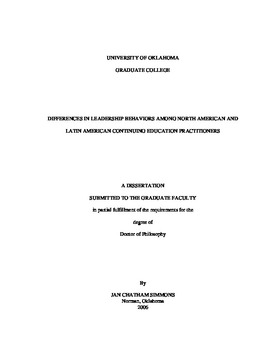| dc.contributor.advisor | Karpiak, Irene E., | en_US |
| dc.contributor.author | Simmons, Jan Chatham. | en_US |
| dc.date.accessioned | 2013-08-16T12:20:07Z | |
| dc.date.available | 2013-08-16T12:20:07Z | |
| dc.date.issued | 2006 | en_US |
| dc.identifier.uri | https://hdl.handle.net/11244/1021 | |
| dc.description.abstract | Leadership training is one of the fastest growing sectors of university continuing education in the US and Canada. The pervading belief that basic leadership and management skills will transfer successfully from culture to culture seems to preclude training aimed at the specific, deep-culture challenges of cross cultural leadership. Additionally, there is a significant lack of representation of Latin American cultures among comparative studies published to date. | en_US |
| dc.description.abstract | In this qualitative study, 18 university and continuing education leaders in North America and Latin America were contacted by e-mail and asked to complete a short essay about their leadership philosophy along with a questionnaire designed to identify the participant's overall leadership style as either transformative/participative or transactional/directive. Participants were then interviewed by telephone, and further follow-up communications were conducted by e-mail and telephone. Neither culture, gender, religion, years in a leadership role, nor professional background appeared to have any correlation to preferred leadership style. All participants highly valued the transformative/participative/democratic leadership style. Latin American participants may have slightly more social contact with co-workers outside the workplace than do their counterparts in the US and Canada. Participants in two Latin American countries were more concerned about being gentle and humble (expressed by speaking much less directly when dealing with issues of discipline or correction) with employees than might be true in the US, Canada, or other Latin American countries. Good relationships were slightly more valued by Latin Americans while integrity was slightly more valued by non-Latin respondents. | en_US |
| dc.description.abstract | Many participants of both cultures expressed the belief that effective leadership skills are becoming more global in nature. Latin Americans, in particular, tended to believe that the university in which they worked was "ahead of the game" and therefore not necessarily characteristic of leadership norms in business and government sectors in terms of implementing transformational/participative leadership styles. | en_US |
| dc.description.abstract | The purpose of this study was to determine differences in leadership behaviors between Latin American and non-Latin North American leaders. This information may provide a starting point for defining culturally-appropriate behaviors consistent with transformative/participative leadership style and provide useful information for designing cross cultural leadership training. | en_US |
| dc.format.extent | xi, 160 leaves ; | en_US |
| dc.subject | Leadership Latin America. | en_US |
| dc.subject | College administrators United States Psychology. | en_US |
| dc.subject | College administrators Canada Psychology. | en_US |
| dc.subject | Leadership Cross-cultural studies. | en_US |
| dc.subject | Education, Adult and Continuing. | en_US |
| dc.subject | Leadership United States. | en_US |
| dc.subject | Education, Bilingual and Multicultural. | en_US |
| dc.subject | Leadership Canada. | en_US |
| dc.subject | College administrators Latin America Psychology. | en_US |
| dc.title | Differences in leadership behaviors among North American and Latin American continuing education practitioners. | en_US |
| dc.type | Thesis | en_US |
| dc.thesis.degree | Ph.D. | en_US |
| dc.thesis.degreeDiscipline | Department of Educational Leadership and Policy Studies | en_US |
| dc.note | Adviser: Irene E. Karpiak. | en_US |
| dc.note | Source: Dissertation Abstracts International, Volume: 67-03, Section: A, page: 0814. | en_US |
| ou.identifier | (UMI)AAI3211359 | en_US |
| ou.group | Jeannine Rainbolt College of Education::Department of Educational Leadership and Policy Studies | |
